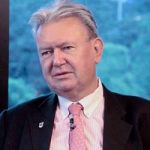New Media | 07 de noviembre de 2012 | Vistas: 44
John Blundell talks about his book Margaret Thatcher: A Portrait of the Iron Lady, which describes her life and achievements as British Prime Minister. He details how her early life and education was, how she entered to the Somerville College at Oxford, graduated as a chemist, and later became involved in the Oxford University Conservative Associations, her beginnings in politics. He describes the economic and political situation of the United Kingdom when she became Prime Minister, what policies she implemented and achievements she succeeded during her 11 years in power. He also shares ten lessons learned from her that are printed in his book, he comments on her historical reputation: how people around the globe think about her, and finally, gives his opinion on the movie The Iron Lady, which he refers is a movie not a documentary.


John Blundell (1952-2014) was Distinguished Senior Fellow of the Institute of…
Nuestra misión es la enseñanza y difusión de los principios éticos, jurídicos y económicos de una sociedad de personas libres y responsables.
Universidad Francisco Marroquín